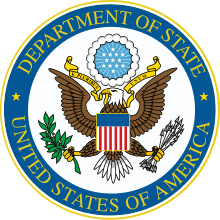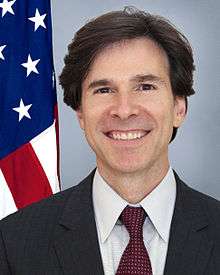United States Ambassador to the Czech Republic
| Ambassador of the United States to the Czech Republic | |
|---|---|
|
Seal of the United States Department of State | |
| Nominator | Barack Obama |
| Inaugural holder |
Adrian A. Basora as Ambassador Extraordinary and Plenipotentiary |
| Formation | June 15, 1992 |
| Website | U.S. Embassy - Prague |
The diplomatic post of United States Ambassador to the Czech Republic was created after the dissolution of Czechoslovakia and the United States recognizing the new nation of Czech Republic on January 1, 1993.
In June 1992, the Slovak parliament voted to declare sovereignty and the Czech-Slovak federation dissolved peacefully on January 1, 1993. The United States recognized the Czech Republic and Slovakia as independent nations and moved to establish diplomatic relations. The previous ambassador to Czechoslovakia, Adrian A. Basora, continued as the ambassador to the Czech Republic and Theodore Russell, who served as deputy chief of mission under Ambassador Shirley Temple Black, became the first U.S. ambassador to Slovakia later that year.
Ambassadors
U.S. diplomatic terms
After 1915, The United States Department of State began classifying ambassadors as career Foreign Service Officers (FSOs) for those who have served in the Foreign Service for a specified amount of time.
Political appointee
A person who is not a career foreign service officer, but is appointed by the president (often as a reward to political friends).
Appointed
The date that the ambassador took the oath of office; also known as “commissioning”. It follows confirmation of a presidential appointment by the Senate, or a Congressional-recess appointment by the president. In the case of a recess appointment, the ambassador requires subsequent confirmation by the Senate.
Presented credentials
The date that the ambassador presented his letter of credence to the head of state or appropriate authority of the receiving nation. At this time the ambassador officially becomes the representative of his country. This would normally occur a short time after the ambassador’s arrival on station. The host nation may reject the ambassador by not receiving the ambassador’s letter, but this occurs only rarely.
Terminated mission
Usually the date that the ambassador left the country. In some cases a letter of recall is presented, ending the ambassador’s commission, either as a means of diplomatic protest or because the diplomat is being reassigned elsewhere and replaced by another envoy.
Chargé d'affaires
The person in charge of the business of the embassy when there is no ambassador commissioned to the host country. See chargé d'affaires.
Ad interim
Latin phrase meaning "for the time being", "in the meantime". See ad interim.
- Adrian A. Basora – Career FSO
- Title: Ambassador Extraordinary and Plenipotentiary
- Appointed: June 15, 1992
- Presented credentials: July 20, 1992
- Terminated mission: Left post, July 15, 1995
- Jenonne R. Walker – Non-career appointee
- Title: Ambassador Extraordinary and Plenipotentiary
- Appointed: June 27, 1995
- Presented credentials: August 31, 1995
- Terminated mission: Left post August 31, 1998
- John Shattuck – Non-career appointee
- Title: Ambassador Extraordinary and Plenipotentiary
- Appointed: October 22, 1998
- Presented credentials: December 10, 1998
- Terminated mission: Left post December 16, 2000
- Craig Roberts Stapleton – Non-career appointee
- Title: Ambassador Extraordinary and Plenipotentiary
- Appointed: August 7, 2001
- Presented credentials: August 28, 2001
- Terminated mission: Left post December 16, 2003
- William J. Cabaniss – Non-career appointee
- Title: Ambassador Extraordinary and Plenipotentiary
- Appointed: October 6, 2003
- Presented credentials: January 13, 2004
- Terminated mission: 2006
- Richard Graber – Non-career appointee
- Title: Ambassador Extraordinary and Plenipotentiary
- Appointed: September 14, 2006
- Presented credentials: October 12, 2006
- Terminated mission: January 20, 2009
- Mary Thompson-Jones
- Title: Chargés d’affaires ad interim
- Appointed: January 20, 2009
- Presented credentials: Unknown
- Terminated mission: May 2010
- John Ordway
- Title: Chargés d’affaires ad interim
- Appointed: May 2010
- Presented credentials: Unknown
- Terminated mission: August 2010
- Joseph Pennington
- Title: Chargés d’affaires ad interim
- Appointed: August 2010
- Presented credentials: Unknown
- Terminated mission: December 30, 2010
- Norman L. Eisen – Non-career appointee
- Title: Ambassador Extraordinary and Plenipotentiary
- Appointed: December 30, 2010
- Presented credentials: January 28, 2011
- Terminated mission: September 30, 2014
- Andrew H. Schapiro – Non-career appointee
- Title: Ambassador Extraordinary and Plenipotentiary
- Appointed: July 23, 2014
- Presented credentials: September 30, 2014
- Terminated mission: Incumbent
See also
- Embassy of the United States, Prague
- Czech Republic – United States relations
- Foreign relations of Czech Republic
- Ambassadors of the United States
References
![]() This article incorporates public domain material from the United States Department of State website http://www.state.gov/r/pa/ei/bgn/index.htm (Background Notes).
This article incorporates public domain material from the United States Department of State website http://www.state.gov/r/pa/ei/bgn/index.htm (Background Notes).
External links
- United States Department of State: Chiefs of Mission for Czech Republic
- United States Department of State: Czech Republic
- United States Embassy in Prague

